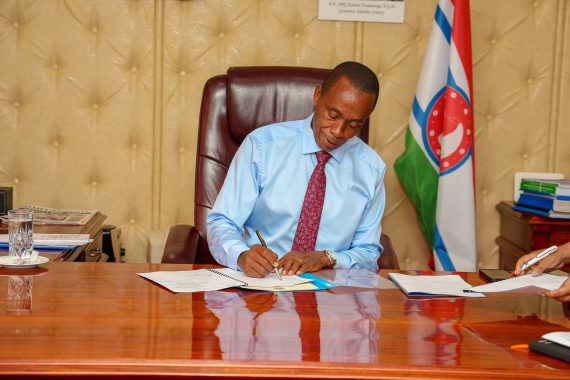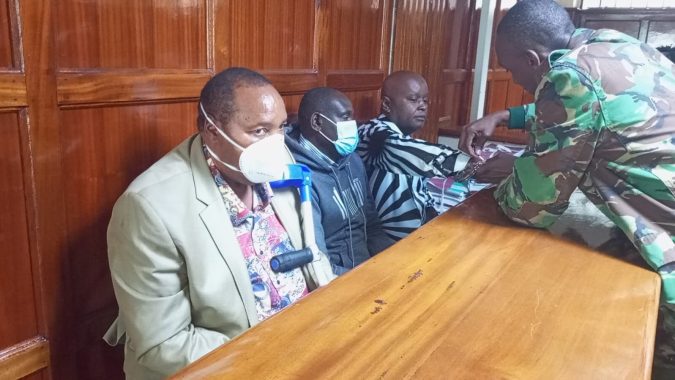The arrest of Kiambu Governor Kimani Wamatangi early Tuesday morning, April 15, 2025, has sent shockwaves through the country’s political and anti-corruption landscape, deepening scrutiny of county-level governance and reviving questions over whether public office remains a vehicle for service or self-enrichment.
The Tuesday morning operation, carried out by detectives from the Ethics and Anti-Corruption Commission (EACC), marked a dramatic culmination of months of mounting pressure, murmured allegations, and, finally, an aggressive investigation into the suspected theft of millions of shillings from Kiambu County coffers.
Wamatangi was arrested at his private residence after EACC officers raided both his home and county offices at dawn.
Eight senior county officials were also taken into custody in the sweeping operation, accused of participating in a web of financial misdeeds, procurement fraud, and abuse of office.
Here is a timeline tracing the events that led EACC to the governor’s doorstep:
1. June 2024 – ghost workers and shadow systems
Concerns over Wamatangi’s administration began to surface publicly when Kiambu Senator Karungo Wa Thang’wa raised red flags over the county’s controversial decision to abandon its automated payment system.
The switch to a manual system, Senator Karungo argued, allowed for the unchecked hiring of ghost workers and facilitated the disappearance of Ksh390 million from the county treasury.
The senator demanded a formal investigation by the EACC, warning that public trust was being eroded by daylight looting masked as reform.
2. September 2024 – whispers of a procurement coup
By late 2024, whispers within the Kiambu County Assembly had turned into calls for action.
Reports emerged of a contract awarded to a firm said to have ties to Wamatangi’s close associates for the supply and installation of an Enterprise Resource Planning (ERP) system.
The contract, valued at Ksh230 million, was issued in the 2022/2023 financial year.
Alarm bells rang loud over claims that no competitive bidding process was followed when awarding the tender.
Instead, what should have been a tool to increase efficiency and transparency became the centerpiece of an unfolding scandal.

3. February 2025 – EACC lays the groundwork
In early 2025, the Ethics and Anti-Corruption Commission confirmed it had launched preliminary investigations into Kiambu County.
Although details remained under wraps, sources close to Integrity Centre indicated that the inquiry had expanded significantly to include claims of fictitious procurement payments totaling Ksh1.5 billion – with some county officials accused of trading directly with the very government they served.
4. April 15, 2025 – the raid and arrest
At dawn, EACC detectives executed search warrants simultaneously at the governor’s residence, county headquarters, and the homes of key officials.
According to a statement issued by EACC after Wamatangi was arrested, the dawn operation netted more than documents: Ksh12 million and USD 13,000 in cash were recovered from Wamatangi’s residence — funds the Commission believes are proceeds of corruption.
In its statement, EACC listed the senior officials arrested alongside the governor:
1. Peter Njoroge Ndegwa – County Secretary
2. Nancy Njeri Kirumba – CEC Finance
3. Salome Muthoni Wainaina – CEC Lands and Housing
4. William Kinyanjui Kimani – Chief Officer, Finance
5. Phyllis Wanjiru Muiruri – Director, Supply Chain
6. Henry Mburu Waweru – Director, Revenue
7. Paul Kibe Wangari – Clerical Officer
8. Bernard Kabaiku Theuri – Director, Filtronic International Ltd
The Commission detailed the nature of its probe: procurement irregularities, abuse of office, and fictitious payments linked to non-existent supplies and services.
“Today’s operation has resulted in the recovery of critical evidentiary material to support ongoing investigations. This includes the seizure of KES 12 million and USD 13,000 in cash from the residence of Governor Kimani Wamatangi which is suspected to be proceeds of corruption.
“Upon conclusion of the investigation, the findings will guide the appropriate course of action — which may include the prosecution of any individuals found culpable, the forfeiture of unexplained assets, and the confiscation of proceeds linked to corruption,” the EACC said.
A county haunted by its past
Wamatangi’s arrest revives the ghost of Kiambu’s former governor Ferdinand Waititu, who is currently in prison serving a sentence over a Ksh588 million corruption case.
Waititu was sentenced to serve 12 years in prison or pay a fine of Ksh53 million after being convicted of graft.
Waititu’s wife, Susan Wangari, was also convicted in the graft case and was handed a one-year jail term or an alternative fine of Ksh500,000.
The former governor was found guilty in four out of seven counts in a case involving the irregular award of a Ksh588, 198,328 road tender during his tenure.

What’s next
Governor Wamatangi and his co-accused are expected to be arraigned in court later this week as investigators analyze the material seized during the raids.
If prosecuted and convicted, the governor could be removed from office and face heavy penalties under the country’s anti-corruption laws.
For now, Kiambu remains under the shadow of its own governance, watching – yet again – as the promise of reform unravels under the weight of scandal.
Martin Oduor
The alchemist of literary works – a master wordsmith with a proven record of transforming the raw materials of language into a rich tapestry of emotion, thought, and imagination.
View all posts by Martin Oduor